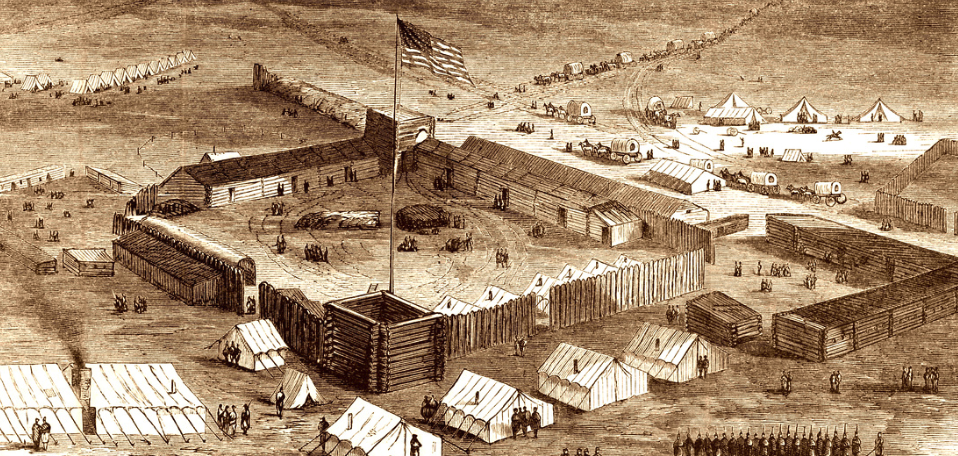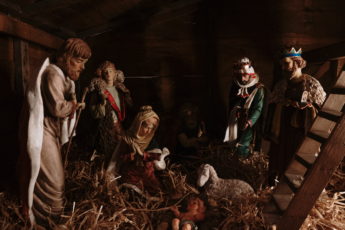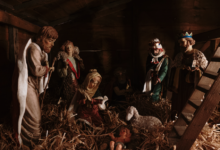
In the mid-1800s, the US of A started planting forts as they pushed west. These forts, also called Frontier Outposts, served as tiny exports of the comfy home culture of Virginia and Massachusetts et al.
Those outposts FELT like “America”… but existed out on the frontier… in a place that wasn’t (yet) “America”.
Supplies were occasional and much needed.
These forts were occupied by hearty people, who believed in the promise of a future very different from their present reality.
They were ready to defend that stake with their lives, because it represented an idea they were committed to with everything in them… all while surrounded by an unforgiving (and often hostile) climate that was, at best, uneasy with their presence.
And this is exactly what you’re called to build, bucko.

Think about it: your God-oriented home is, like Abraham himself, looking forward to a city “not made by human hands, whose Designer and Builder is God“. You are surrounded by people who don’t see it that way. And your outpost will have to represent a Culture that doesn’t much exist in your town.
You’re an ambassador for a coming King. Your job is to produce a few people who understand this Kingdom’s foreign culture as their own… and then export it to as many people as are willing to receive it.
EVERY HOME AN OUTPOST.
Think of your home’s culture as an ongoing science experiment inside that Outpost construct: you’re constantly learning more about how your family works best, how to build into your family, and what your family was designed to output for others. And outsiders to your home (like the good people at Abe’s Wallet, poking their noses in with what they HOPE is helpful advice) can help ask the right questions, but they really can’t give you your specific answers. Those have to come from you alone. And you’re constantly iterating, tinkering with the formula! (That’s one of the reasons that summits are so valuable: they afford you the opportunity to step away and consider what’s happening and why. If the culture of your home is accidental instead of carefully curated, the results can’t help but be random as well.)
It’s a tall order, isn’t it!? Representing the King while still figuring out what you’ve got in your fort? It IS hard. We need all the help we can get. The good news is that the culture you’re going for is outlined explicitly in a Real Good Book that is available all over the place (here’s my favorite version at the moment).
[I grant you that your home isn’t supposed to work exactly like mine. There will be some similarities (evening meals, family prayer, Sabbaths, enduring love of the Dallas Mavericks) but our differing callings, giftings, and personality mixes will inevitably translate into diversity between our homes. (“It’s your life and i’m not gonna live it” as Jude Cole annoyingly crooned back in 1986.) But for EVERY Abrahamic leader, our homes will ALL, even in their diversity, play a similar, wordless song of the Once and Future King and of His Everlasting Kingdom.]

Add to this the fact that, again, Jesus-centric households are as foreign to modern America as nerves are to Luka Doncic and you, my family leader, REALLY ARE living on a frontier. Our initial metaphor holds:
Just as the frontier forts littered across the American West represented an outpost of a culture that was being incarnated into what was mostly untamed wilderness, your home must be in the world.
- They must be self-sustaining, inasmuch as you can feed and cultivate spiritual health inside your own home. This includes securing an encouraging and challenging community around you and is made possible by prayer and the Bible’s radical portability!
- They must be self-defending, in that there are active restrictions on the world’s influence and threat against the purity of your collective walk with God. Even language differences should exist between you and the culture in which your family is embedded. The mere fact that something is on broadcast airwaves doesn’t mean it’s fit for your family’s consumption. Your movie choices aren’t dictated by an MPAA rating, but by comparing its themes and values to that of Kingdom culture. The proper use of a Saturday, even, will by dictated by an unseen Governor, not by cultural norms. Etc. etc. (Apply everywhere.)
- They must be self-policing, in that accountability for character, belief, and behavior isn’t foisted upon you by outside forces, but is secured by parental leadership inside the home.
If this is true, that each family is to have a different flavor to it based on the people who comprise it, then this conviction of “standing on our own two feet” is crucial. Said another way, if your home can’t possibly be a carbon copy of any other home, then by golly, you’ll need the grit to plant your own flag, and declare “this is where WE stand, as a family. We might be similar to other families in some way, but we’re our own thing, and we won’t be moved from our bedrock convictions. In good conscience, we’re moving somewhere by God’s (and dad’s) leadership. So be it.”
This idea, that each family stands alone, isn’t something I just thought up:
- The family unit is the building block of society. That is to say, it’s the smallest possible unit of a society that still retains its unique properties. Those properties would include the three things listed above and other factors like language, habits of eating, rest, exercise, work, relationships, reproduction etc. etc. It’s a lot of weight to put on a group… and nothing short of a family can handle that burden. Sociologists demonstrate to us that when families (those are defined here, if you’re interested) disintegrate in any way–from divorce, to any family member dying, even so much as a family member suffering a life-changing injury… the family often fails. The question of validity for a “building block” is: were all of society made up of only this model, would the society stand? And the answer, with regards to a family, is a resounding YES. Not only would “everyone in a godly family” stand as a sure, strong model for society, it would exponentially increase the strength of any nation on earth. Show me any alternate that could stand up under that weight. No bridge club could make it; no fire department; no Bible study, nor any other grouping of people. Only the family, as God defines it, could pull it off.
- The family unit also happens to be the building block of the church. You may have picked up over time that the local congregation is the smallest viable unit of the “called out ones”, but I speaketh unto thee NAY NAY!
- This is true Biblically. Back in OT days, Moses or whomever would call together heads of families to make governmental decisions, not gang leaders or warlords. Israel was grouped and managed by families. In NT days, churches were identified not by gifted individuals who led them, but by hosting families who ran their households, and facilitated church meetings through them. You won’t find talk of pastors or any other spiritual communities in the scriptures outside of those arising from homes, because… they didn’t exist! (Even heroes like Jesus and Paul, single men, operated in and through other families, recognizing their authority in God’s system.) Strong spiritual communities were simply combinations of households that banded together for encouragement, accountability, and the give-and-take of spiritual gifts. Ergo, “the church at Rome” simply meant the network of families that followed Jesus there. There was no organization, no headquarters, no central building that received money to keep the heat running and perpetuate itself. (I’m not saying there’s no value to the 3rd party church organization… but I AM saying that its existence has led to families missing out on their key role in their own spiritual health, and that of their wider communities.)
- This is also true practically. I know of several examples of a single family hanging onto spiritual life, then later expanding into nation-changing networks of many, many families. Two such high profile examples would be when Francis and Edith Schaeffer took their family to Switzerland and lived as a self-sustaining church for years and years, until their children started bringing friends home from university, inviting them into the rhythms of their family, and disciples started being made. An entire missionary movement launched from that home. Another is the bar Davids; they emigrated from pre-Soviet Bulgaria to their ancestral home of Israel (then called “Palestine”) in the 1920s. When Israel regained its sovereign nation status in 1948, the bar Davids represented 11 of the 14 people in the nation who believed in Jesus as the Jewish Messiah. They endured as a church-in-a-house, and proliferated. They now operate an entire Messianic kibbutz, called Yad Hashmonah which houses about 50 families and has its own school, businesses, etc. (There are now over 15,000 Jewish followers of Yeshua in Israel.) Cool right?
[You can probably understand why I’m always saddened when I see a Christian family who has abandoned their children’s values to a school, or a father abdicates his place as the spiritual leader of the home to a pastor or counselor. Similarly, I’m emboldened and challenged every time I come across a self-composed family that knows who they are, takes an identity out into the world (instead of searching for one in the world), and makes their own decisions about spiritual and moral development. The factory production model of education and religion (I’ve asked this question before but, seriously, how many people even have a personal relationship with the “pastor” of their church, let alone being personally counseled and led by him?) has shaped us into thinking that our homes are a place for receiving and consumption, instead of a place for industry, diligence, creation, and management. I’ve heard that’s not a Biblical idea.]
I guess what I’m saying is, YOU’RE THE MAN NOW, DAWG.

God doesn’t come looking to your local pastor when He wonders why His people don’t fast, or worship, or give, or know the Scriptures. And He doesn’t come to your Senior Executive Administrator when He has a super cool assignment to hand out, or a prophetic revelation to bestow. He comes to the city as HE sees it: families, networked together by love and mutual submission. When God said “If My people…” He wasn’t thinking of Baptists or Catholics or any other group… besides the family unit.
So I say hooray to every father who’s willing to plant their flag on their block and say, “We will endeavor to follow the LORD! We will train our children in the fear of Him! We will put a guard on our mouths, a governor on our flesh, and a banner over our home, that we live for an unseen Kingdom which is gaining ground all over the world (Mt 11:12) and which will someday cover the earth with His good glory! The lost world is the frontier and we’re going exploring!”






